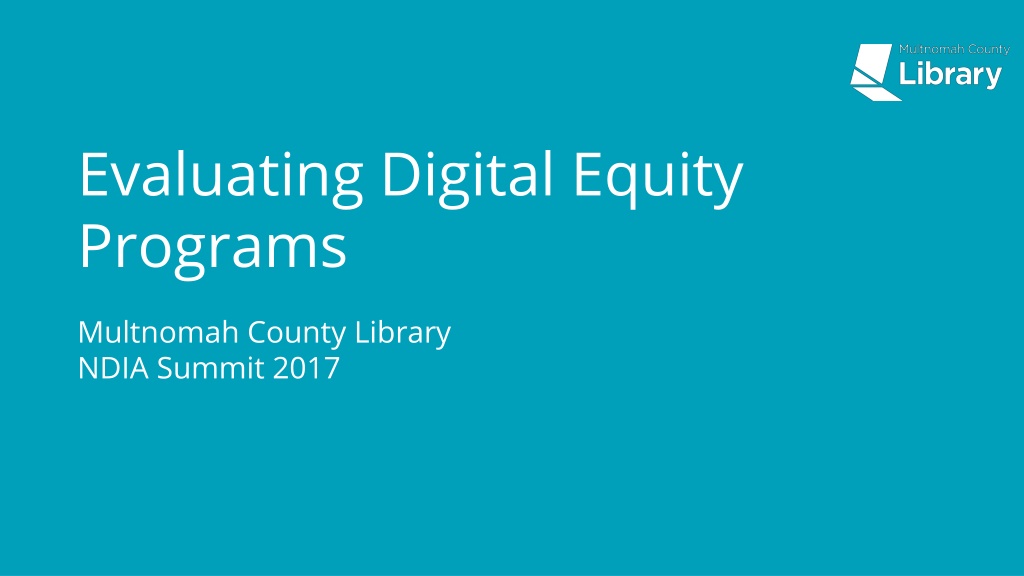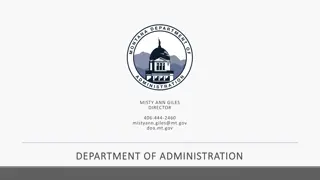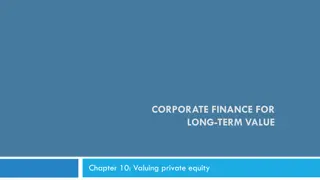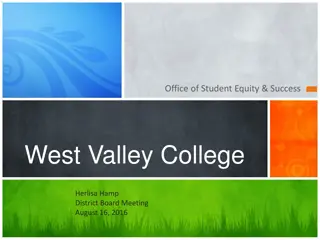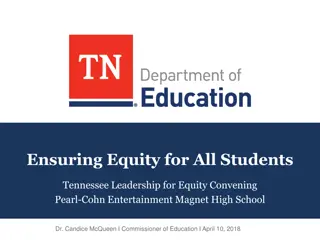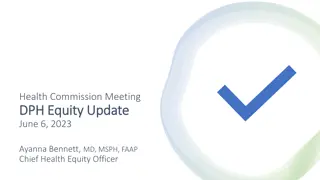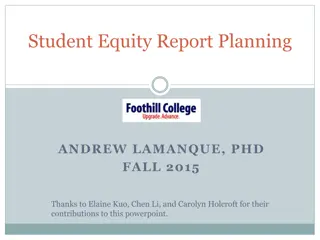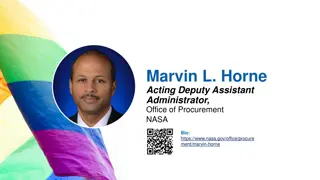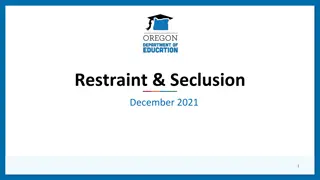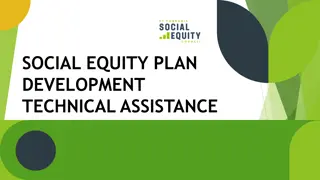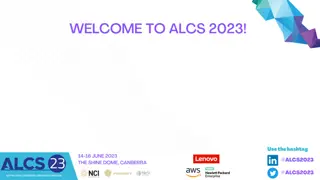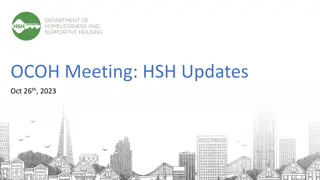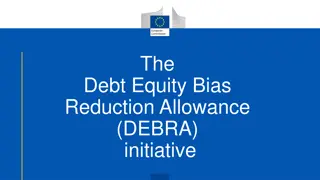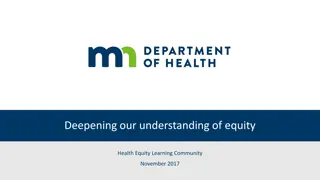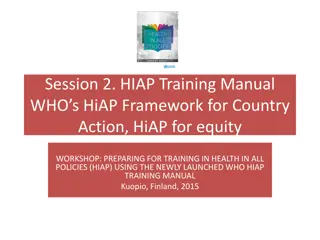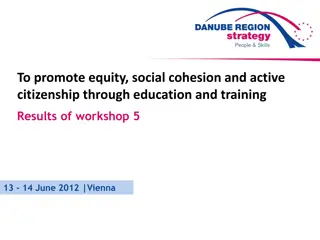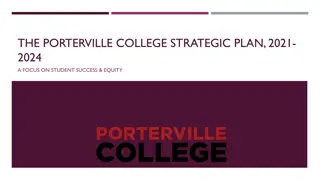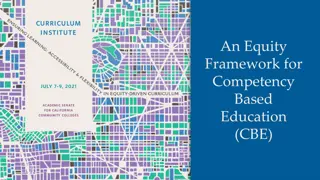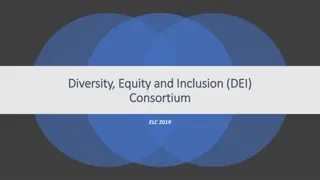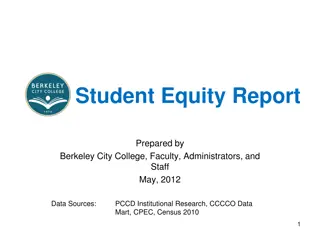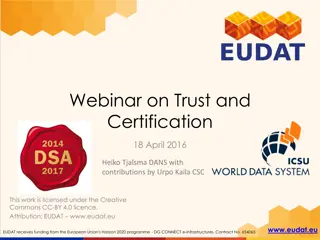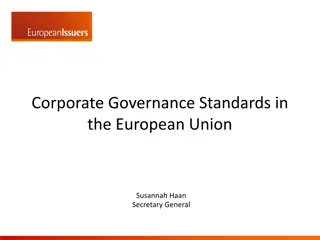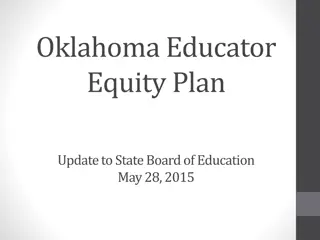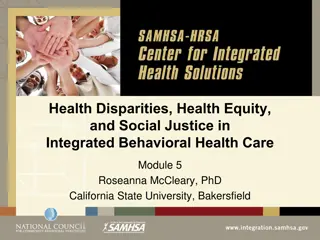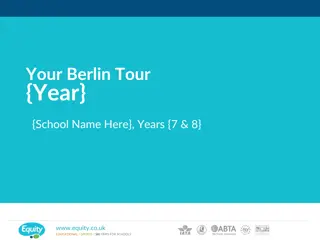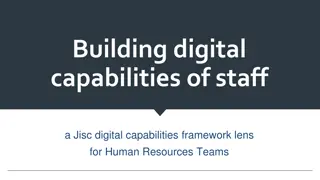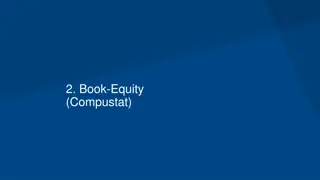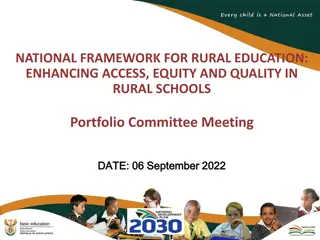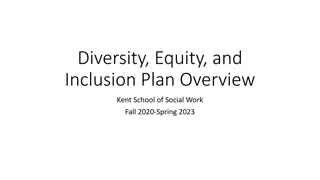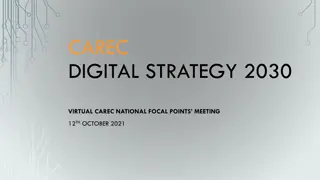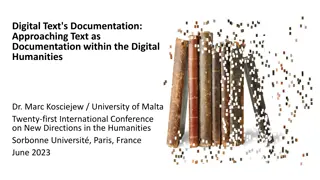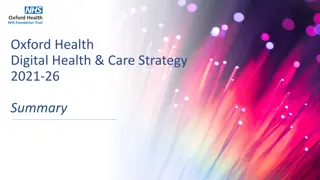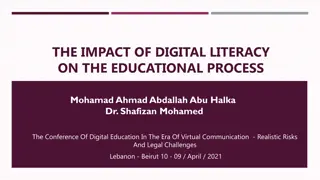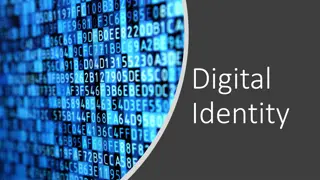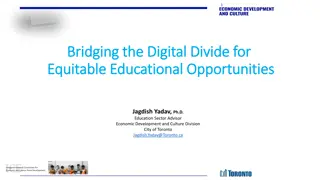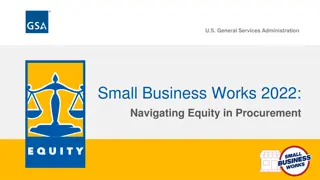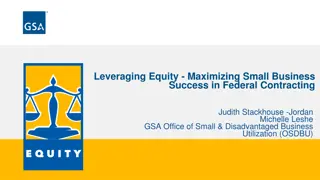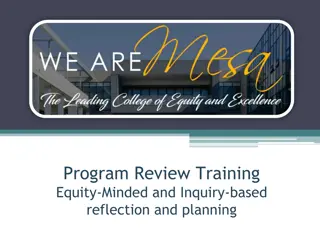Digital Equity Initiatives and Success Framework
Multnomah County Library's Digital Equity Action Plan (DEAP) outlines a comprehensive strategy to address digital divide issues. Key components include affordable internet access, training for digital skills, capacity building for partners, and connecting individuals to the digital economy. Success is measured through defined goals and milestones with a focus on reaching targeted populations and empowering organizations to tackle digital disparities effectively.
Download Presentation

Please find below an Image/Link to download the presentation.
The content on the website is provided AS IS for your information and personal use only. It may not be sold, licensed, or shared on other websites without obtaining consent from the author. Download presentation by click this link. If you encounter any issues during the download, it is possible that the publisher has removed the file from their server.
E N D
Presentation Transcript
Evaluating Digital Equity Programs Multnomah County Library NDIA Summit 2017
Creating a DIN 2014: MCL & Portland OCT kick off the Digital Inclusion Network with a DIN Summit to engage stakeholders. 2015: Digital Equity Action Plan: Focus groups with participants impacted by digital equity issues; Workshops with community stakeholders, government agencies, CBOs, etc. Goal: to collaborate on creating an actionable plan. 2016: The DEAP is unanimously adopted by the City of Portland and Multnomah County. We win the NATOA Strategic Broadband Plan of the Year! Woot!
The Digital Equity Action Plan The DEAP: A 3-year plan with 5 concrete goals: 1. Access to affordable high-speed Internet and devices 2. Training & support for digital skills 3. Leadership & Capacity Building for community partners 4. Connecting people to the digital economy 5. Building a policy framework that supports digital equity
Goals & Milestones Framework: An actionable plan Five Main Goals with 17 Milestones
Defining Success The DIN partners identified 3 key questions that we want to answer for each of the strategic actions in the Digital Equity Acton Plan: 1. Are we reaching targeted populations* through project activities? 2. Have we identified promising/effective activities for addressing the digital divide? 3. How has the DEAP empowered organizations to build capacity to address the digital divide? *Targeted populations include low income individuals and families, older adults, people of color, people with disabilities, and those with limited English proficiency.
Defining Success To be considered promising, activities should: Engage the targeted population in the activity design, planning and assessment. Be designed based on best practices and research. Provide informative feedback to practitioners about the learning progress of the targeted population. Allow for the targeted population learners to self-assess progress.
Defining Success To be considered effective over time, activities should Reach the targeted population Be potentially scalable to other targeted populations Indicate evidence of reducing the digital divide for a targeted population
Defining Success Activities help build capacity if, as a result of the DEAP, the organization formed new partnerships; improved its ability to meet client needs; refocused resources or identified new resources to support digital equity work; expanded its digital equity services and/or client base; and/or placed a higher priority on digital equity work
Defining Success The lead partners for each of the strategic actions are working to collect data that will allow them to report results against these key questions.
MCLs Book-A-Librarian Multnomah Count Library offers one-on-one sessions on any topic About two-thirds of these sessions involve computer skills support or help with using a personal device to access e-content Augments traditional technology-training classes One-on-one format has been very successful in meeting patrons needs.
MCLs Book-A-Librarian The Library collects three outcome measures collected based on the methodology of the Public Library Association s Project Outcome Outcomes can be quantitative or qualitative, and are often expressed as changes that individuals perceive in themselves. Project Outcome helps libraries measure four key patron outcomes knowledge, confidence, application, and awareness in seven key library service areas, including Digital Learning.
MCLs Book-A-Librarian Results so far: 97.6% of Book-A-Librarian users agreed or strongly agreed that they were satisfied with the results of the appointment. 97.5% agreed or strongly agreed that they were more confident in their skills/knowledge/abilities 97.2% agreed or strongly agreed that the skills/knowledge/abilities they gained would help them pursue their goals.
MCL/Free Geek Earn-a-computer program Offered in partnership between the library and Free Geek, and staffed by MCL Digital Inclusion Fellow Charly Eaton, and Free Geek Digital Inclusion Fellow Sara Rasmussen. Provides five computer and internet training sessions to digitally excluded target populations. Upon completion, participants receive their own refurbished computer from Free Geek. Raises awareness of the options for low-cost home broadband access and measures adoption rates among participants.
MCL/Free Geek Earn-a-computer program Pre Program Survey Post Program Survey Program Impact Assessment, administered 3 months after completion of the program
The strengthening partnerships we've developed through the Digital Inclusion Network (DIN) have led to coordinated data collection processes. Looking at similar data across programs will help us all understand where we are succeeding and where we can improve as we implement the Digital Equity Action Plan (DEAP). This work has been well-received, especially by our partners who may not have deep resources for developing their own data collection methods. Cindy Gibbon Access and Information Services Director Multnomah County Library From Innovators in Digital Inclusion: Multnomah County Library by Angela Siefer
Links https://www.portlandoregon.gov/revenue/article/573122 https://multcolib.org/we-can-help-anything http://www.ala.org/pla/initiatives/performancemeasurement https://www.benton.org/blog/innovators-digital-inclusion-multnomah-county-library
